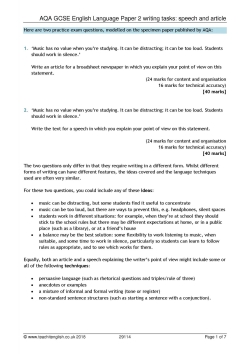AQA GCSE English Language Paper 2 writing tasks: speech and article

This popular, scaffolded lesson resource includes two practice exam questions for AQA GCSE English Language paper 2, Section B and helps students to explore the differences between two non-fiction forms — speeches and articles — in terms of the presentation of ideas and the use of language techniques.
It summarises a range of techniques that students might use in a speech and a newspaper article, including persuasive language (such as rhetorical questions and triplet/rule of three/triadic structure), anecdotes or examples and using a mixture of informal and formal language and direct address such as pronouns. The classroom worksheet also asks students to consider the most appropriate tone or register for purpose and audience, and whether using non-standard sentence structures (such as starting a sentence with a conjunction) could engage a reader’s attention.
It's perfect for exam practice and preparation for AQA GCSE English Language students. Suggested answers (a lesson ‘mark scheme’) are included to support young people with their exam preparation.
You might also our other AQA English Language Paper 2 resources, or see more speech and article lesson activities such as AQA GCSE English Language Paper 2 Section B exam task.
Practice GCSE exam questions for AQA English Language Paper 2, Section B from the resource:
Students work through a set of 4 activities which show them how to write the text for a speech or an article, in response to this statement:
‘Music has no value when you’re studying. It can be distracting; it can be too loud. Students should work in silence.’
a) Write an article for a broadsheet newspaper in which you explain your point of view on this statement.
or
b) Write the text for a speech in which you explain your point of view on this statement.
Task 1
This task prompts students to look for language features which are relevant to the text types of article writing and speech writing. Students are asked:
Can you work out which were written for a speech and which were written for an article? What are the differences? What clues did you use?
Task 2
Students look at example sentences for both non-fiction writing tasks and identify the persuasive features, demonstrating how to write an article and text for a speech.
Task 3
Students practise the two forms of writing with their own sentences.
Task 4
Students reflect on the activities:
In summary, what have you learned from these activities about:
-
the language techniques you could use in an article and the text for a speech
-
the ideas you could cover in an article and the text for a speech
-
the differences between writing an article and the text for a speech?
They then respond to their chosen essay question and start their own piece of writing as exam practice for the GCSE English language exam, choosing a specific audience to make their use of language more appropriate, such as broadsheet newspaper readers of The Guardian, or a speech to young people their own age.
As an extension or stretch and challenge task, ask students to identify a range of other techniques they could use. Some students will be familiar with the mnemonic DAFOREST (Direct address, Alliteration, Facts, Opinions, Rhetorical questions, Similes and metaphors, Emotive language, Triplets) but they might also want to consider emotive language, hyperbole and their use of connectives. Alternatively, ask students to plan their first paragraph in the lesson, before finishing their piece of writing at home.
All reviews
Have you used this resource?
Review this resource14/01/2022
10/12/2021
24/11/2020
22/10/2020
28/09/2020
04/08/2020
17/03/2020
02/03/2020
24/02/2020
07/12/2019
